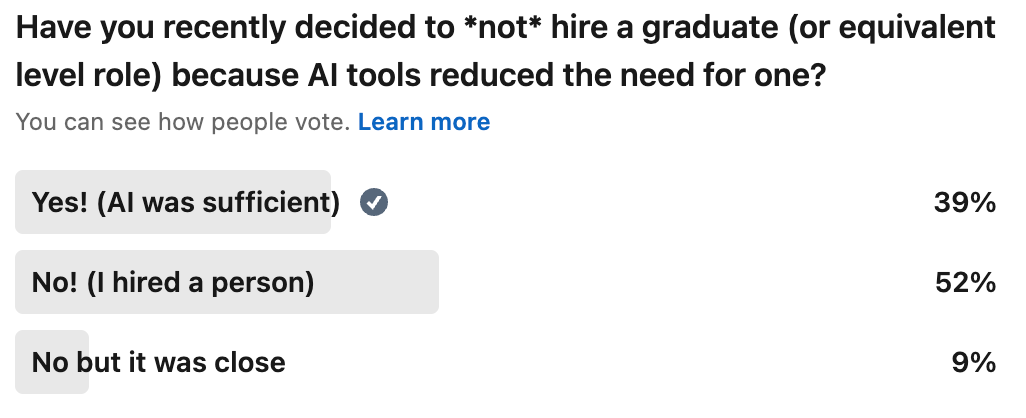How the next five years of AI plays out for Gen Z
(and probably a bunch of Millennials too...)
“Is AI killing graduate jobs?”, asked the Financial Times a few days ago. “Not really but kinda-maybe-soon” is a pretty good approximation of their answer. I’d written broadly about this a few weeks back in my Gen Z Might Be Screwed post, looking at similar data. Over the weekend I took a slightly more scientific approach to my anecdata with some LinkedIn polling. The results add a bit more of a quantitative (and real-time) shape to the trend:
One way to think about many university programs is you’re taking a levered long position on a knowledge-based career. The general nowish timing of LLM emergence into the workplace makes this almost the perfect time that you should definitely not be making this kind of trade.
It was in this context that I read the US AI Action Plan over the weekend and was struck by the very specific language being used.
“The Trump Administration supports a worker-first AI agenda. By accelerating productivity and creating entirely new industries, AI can help America build an economy that delivers more pathways to economic opportunity for American workers. But it will also transform how work gets done across all industries and occupations, demanding a serious workforce response to help workers navigate that transition.”
And more specifically:
“Issue clarifying guidance to help states identify eligible dislocated workers in sectors undergoing significant structural change tied to AI adoption, as well as guidance clarifying how state Rapid Response funds can be used to proactively upskill workers at risk of future Displacement.”
The general rumblings on graduate employment are almost certainly the canary in the WFH coalmine. Gen Z and Millennials produce about 60-70% of knowledge worker output across the west, representing something like a third of the combined GDP in the US and EU.
The world is definitely getting weirder and it increasingly appears that odd situations can stay odd for a surprising amount of time. The notion that AI adoption (and adaptation) could create some net positive macro economic growth but also 20% sectoral unemployment for a period is perhaps not crazy.
Both Europe and the UK have an interesting opportunity here. Just how much of a worker-first AI agenda the US will truly take obviously remains to be seen but it’s fascinating they reached that point before the EU (which is still talking about AI in gentle-breeze terms from an employment impact perspective).
Increasingly I am thinking of content creation as the closest thing we have to Universal Basic Income (UBI). Certainly for Gen Z, many who don’t get jobs (or get laid off) will probably, at least in part, spin up more social activity from which they will get paid. Advertising as an essential social substrate is a weird set of words to put together but that seems to be the direction of travel.
There is a counter-factual version of the internet’s history where in the very early 1990s, the telco companies managed to enact some kind of content infrastructure tax. Dario Amodei’s idea of a token tax for AI is intriguing and feels like a similar moment. It will be interesting to see which government jumps on it.


The only way we get close to UBI is within very largescale persistent games, blockchain-enabled, obvs.